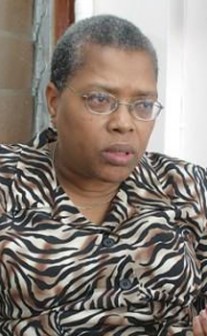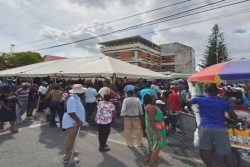(Trinidad Guardian) Dr Petronella Manning-Alleyne, sister of former prime minister Patrick Manning, claims drugs being used by cardiac patients in T&T could be putting them at risk. “We are sourcing medication from areas of the world where standards are questionable and may not be effective because of limitations,” Manning-Alleyne, a medical doctor, said yesterday. She said there was evidence the medication her brother was taking to prevent him from developing a stroke had failed him. She also expressed concern that while tests he took at the Eric Williams Medical Centre on January 6 showed the value of the drug was low, this information was not communicated to the family until 21 days later, after Manning suffered a stroke on January 23.

Manning-Alleyne said they would never know whether, had the results been presented to them before, precautions could have been taken to prevent the stroke. She added: “At least, if he had the result of that test it would have given him an opportunity for the kind of care he required to avoid this happening. “He just did not have the opportunity because they did not give him the results of the test.” She said Manning’s wife, Hazel, spoke to Health Minister Dr Fuad Khan about the drugs but while those discussions and investigations were taking place, she felt it was her responsibility, as a medical practitioner to inform the nation of her findings. At a news conference at Manning’s San Fernando East constituency office, Manning-Alleyne said her brother was using the medication Warfarin since 2004 to thin his blood. She said the medication failed him on January 23 when he suffered a stroke at his Sumadh Gardens, Vistabella, home.
Dr Manning-Alleyne said although her brother had his heart surgery in Cuba, all his medication was sourced in T&T, in the private and public sector. She noted at around the time Manning fell ill, there was information coming out of Pakistan that some kind of heavy metal was found in drugs used by cardiac patients and 36 people had died. Manning-Alleyne said the family decided to source the medication out of Canada and that improved his condition.
She said: “It was very interesting to note that what he had been taking and also what the SFGH had been using resembled exactly the medication we had sourced and had been manufactured in Canada. “I am questioning the quality of the drugs we are getting in the health sector in T&T. I am questioning the standards. “I am questioning what T&T has as its requirement for the purchasing of drugs. I am wondering whether we are purchasing drugs in the interest of the client/patient, or whether we have partisanship,” she charged. Manning-Alleyne expressed concern “that we are sourcing our medication from places where low standards exists, that in so doing we are jeopardising the health of our population.” She added: “We need to know where these medications are coming from and when did we start purchasing these medications.
“People out there need to know that even though it looks like Warfarin, it may not be Warfarin and they need to be very careful about which medication they use. “I also need to know whether this problem is confined to Warfarin or how widespread it is in the health services… the effect of other drugs people use and depend on for their well being.” Manning, 65, the Member of Parliament for San Fernando East, was flown to Washington on Monday morning to continue his treatment at a rehabilitation facility there. Warfarin is used to prevent blood clots from forming or growing larger in blood and blood vessels. It is prescribed for people with certain types of irregular heartbeat, people with prosthetic (replacement or mechanical) heart valve, and people who have suffered a heart attack.
It also is used to treat or prevent venous thrombosis (swelling and blood clot in a vein) and pulmonary embolism (a blood clot in the lung). Warfarin is in a class of medications called anti-coagulants (blood thinners) and works by decreasing the clotting ability of the blood.





